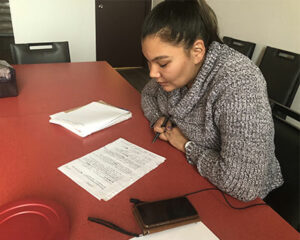Powerful stories bring Indigenous perspectives to higher education
Storytelling is at the heart of the oral cultures of Indigenous peoples in Canada. A unique project in Quebec led by Dawson College faculty uses storytelling to advance the inclusion and welcome of Indigenous cultures and students in higher education institutions.
“Our project is about changing the culture in academic institutions, underlining the need for Indigenous people to have leadership roles within these institutions and making sure that Indigenous perspectives are reflected and part of the educational experience for everyone,” explained Michelle Smith, a faculty member of Dawson’s Cinema | Communications Department and principal investigator.
100+ storytellers involved
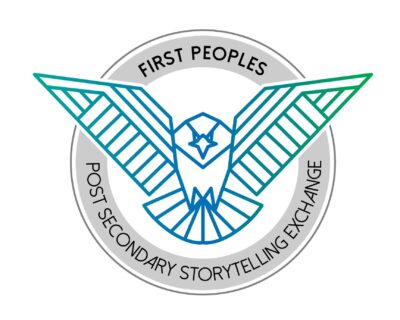
The First Peoples’ Post-Secondary Storytelling Exchange (FPPSE) project brought together more than 100 people to share their stories in traditional talking circles, filmmaking workshops and interviews that were conducted across the province, including remote communities, from 2016-2020. With the creation of 30 video interviews and 10 thematic videos, a dozen narrative films, an Indigenous research methodologies manual, recommendations and a website, the first phase of the SSHRC-funded project is now complete.
The work of the FPPSE is the result of the following partner organizations: Dawson College, Abtec, Air Inuit, Chaire-Réseau de Recherche sur la Jeunesse du Quebec – volet Premières nations et Inuit, Concordia University, Dawson’s Cinema | Communications Department, First Nations Adult Education School Council, First Nations Regional Adult Education Centre Indigenous Futures, John Abbott College, KSDPP, Kahnawake Library, Kahnawake Survival School, Kativik Ilisarniliriniq, McGill University, Mushkeg Media, Nasivvik Residence, Our World.
Storytelling project goals
“Our goals were to create space for Indigenous post-secondary students to share their experiences, address barriers within post-secondary institutions and to support conversations between post-secondary students and communities,” said Michelle.
The project followed Indigenous research methodologies and was guided by Community Advisory Boards, composed of community elders and leaders, students and young people, professionals and educators from the Cree, Inuit and Kanien’kehá:ka nations and the urban Indigenous community of Montreal.
The project is bringing forward concrete recommendations about education for Indigenous young people. “One mother told me: ‘we want to have a say in the future of post-secondary education. We are sending our children off to school and we want them to be supported.’ A father from Nunavik shared how painful it is to send his children away down South. Everyone is asking for education in the North,” she said. “We want to move forward in the right way reflecting the needs and aspirations of the communities.”
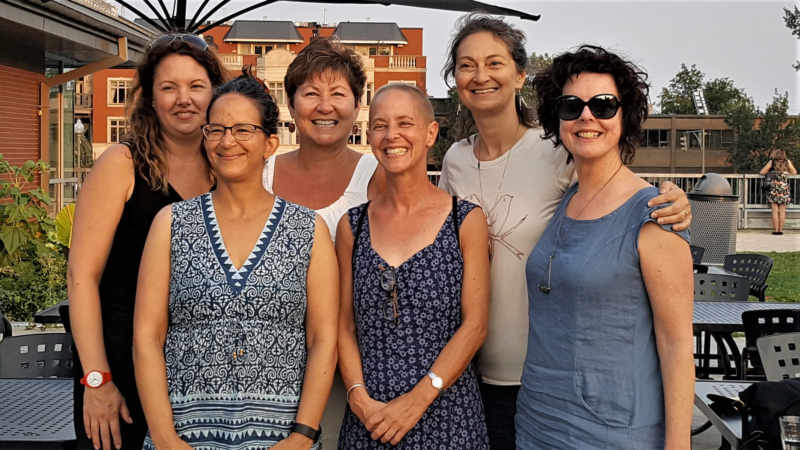
Indigenous research methodologies
In the research work, an effort was made to be non-hierarchical. “We had a deep respect for the process,” said Laura Shea, a Dawson faculty member in the Sociology Department and FPPSE team member. “It was important for us to keep checking in with the Community Advisory Boards at various stages.”
Laura said they were also careful to avoid the extractive approach of conventional research, which has been critiqued by Indigenous scholars. “We worked to maintain the integrity of each individual story,” she said.
There were several challenges along the way, including the loss of Susan Briscoe, who initiated the project and was a faculty member of Dawson College’s English Department, and the pandemic.
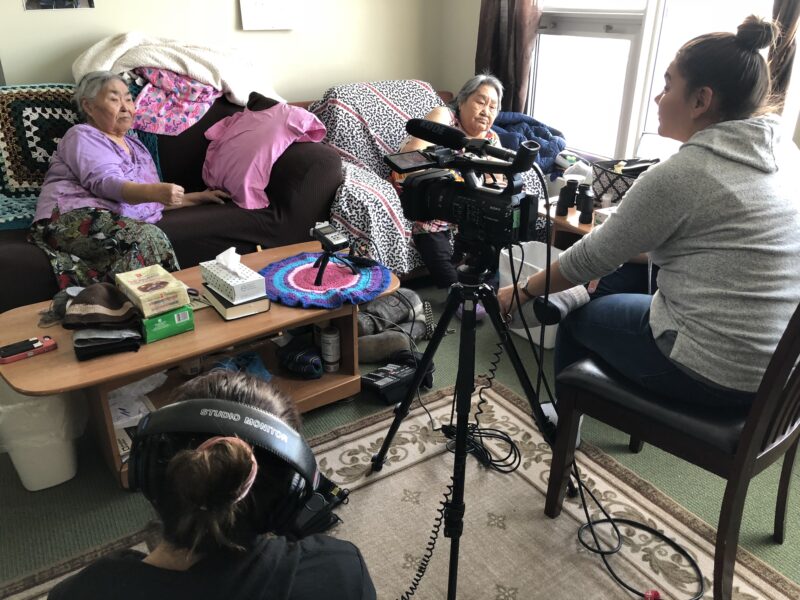
Launch event is Feb. 16
After five years of work, the launch event on Feb. 16 will be a celebration open to all. It will feature the launch of a website that offers a substantial bank of resources for educators, students and families and showcases stories gathered by the innovative project methodology.
An elder from Kahnawake will open the event. Students will share their experiences, researchers will present their outcomes and a video will be premiered. “We will be celebrating the project and the community that was built through the project,” Michelle said.
A private ceremony will be held first for the storytellers who participated. “We want to honour their contributions and their strength, courage and resilience,” she said.
The next phase of the project will be its dissemination and bringing results to Indigenous communities, hopefully with in-person meetings and events when possible and safe in the future.
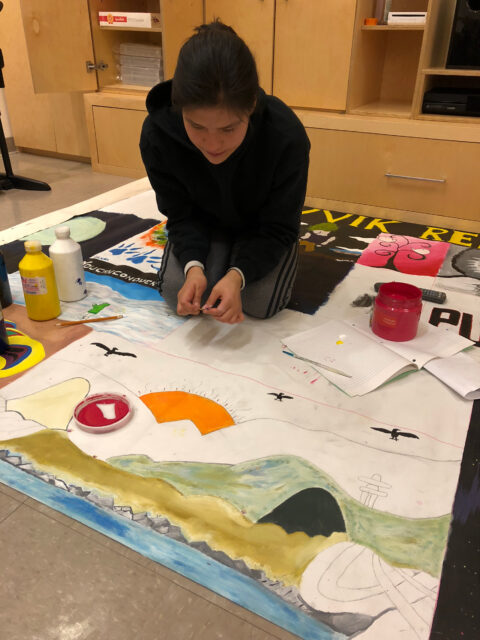
First Peoples’ Post-Secondary Storytelling Exchange (FPPSE)
- Launch event featuring stories, video premiere, website launch, research findings and more
- Open to all
- Tuesday, Feb. 16: 4 p.m. – 6 p.m.
- Join the event on Zoom: https://us02web.zoom.us/j/83801087920
Quotes from FPPSE Storytellers
“Success is learning your customs and language – and learning in post-secondary; it’s taking the best form of education you’re receiving and merging it with the wisdom of your ancestors.”
– FPPSE storyteller
“Firstly, we as Inuit, with our traditions, are very different. The idea of learning in a classroom is not Inuit tradition. My parents, grandparents and all the people before us, were taught on the land about the land. The boys watched their fathers while the daughters watched their mothers. They might have been told what they were learning, but they learned mostly by watching. They learned where to hunt and where the land was good or where there was danger and what it was. That is our traditional way of learning as Inuit. This has been our way for many years so learning in a class all of a sudden is not easy.”
– FPPSE storyteller
“Sometimes, whenever I go back home, I feel like an outsider now because I strived or succeeded in some way, unlike my family members. When I graduated college they still thought I was just gonna go back home, but I decided I wanted something more than that. So they’ve been asking me how long it’s gonna take and it’s really stressful. Like wanting to please them, but also wanting something more for myself is a struggle that I always deal with. I want to be home just to be with family but I can’t achieve my education up there.”
– FPPSE storyteller
“I think the First Peoples’ Centre was the only thing that really got me through my program. And having that family there, that is my family now in Montreal because I don’t have any relatives here. So I think that was my learning experience.”
– FPPSE storyteller
“It seems like it’s a world away sometimes, even though it’s half an hour away from town. But when I first started, it was like I was going to the edge of the universe. I never really knew anything about the city or the people. Academia itself was so foreign to me. And actually getting into it wasn’t that hard. Everyone thinks writing essays and taking exams is a very stressful thing, but it really isn’t. It’s not that bad. Because we’re all smarter than we think we are, than we know we are. We have all this information that we kind of grow up with. And it’s just applying it in different ways is what seems scary to people but it’s not at all, really.”
– FPPSE storyteller
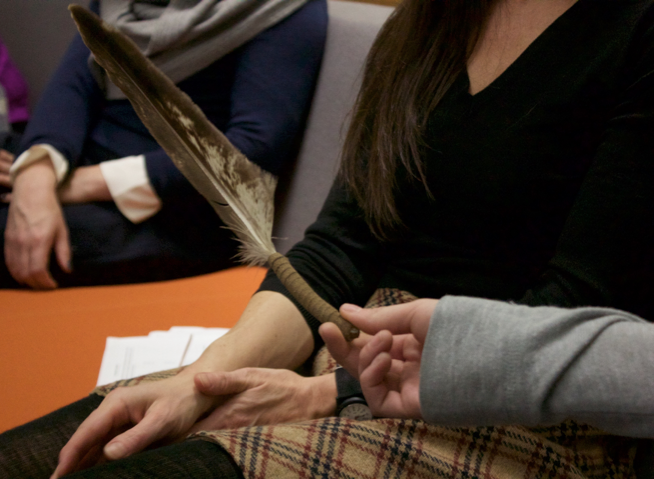
Project Acknowledgements:
Project Team: Susan Briscoe, Michelle Smith, Vicky Boldo, Elizabeth Fast, Nicole Ives, Reisa Levine, Jason Edward Lewis, Morgan Phillips, Laura Shea.
Research Assistants: Jeannie Calvin, Lucina Gordon, Kahawihson Horne (Class of 2015, General Social Science), Anna Kristensen (Class of 2019, CRLT), Sandra-Lynn Leclaire, Mel Lefebvre, Christine Qillasiq Lussier, Jennifer Qupanuaq May, Cheli Nighttraveller, Pasha Partridge, Angela Watts (Class of 2017, ALC- Literature).
Additional involvement: Tiawenti:non Canadian of the First Peoples’ Centre, Karla Gruodis (former Dawson faculty member), Alex McComber of Dawson’s Board of Governors, Cheryl Simon and Dawson’s Cinema | Communications, Dawson’s Research Office.

